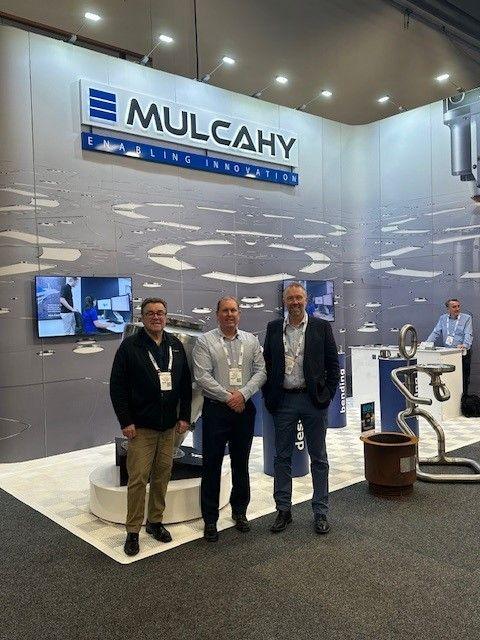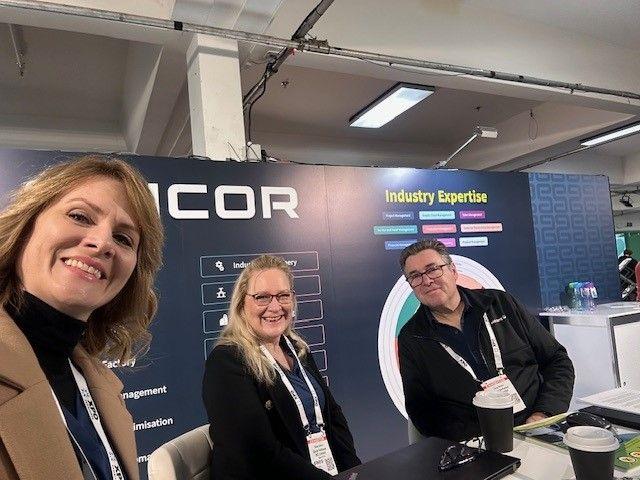Mulcahy Engineering and Epicor comment on EMEX 2024
How did you find EMEX 2024?
Kayne Mulcahy, Managing Director, Mulcahy Engineering
Graeme Evans, Regional Vice President (ANZ), Epicor
Kayne Mulcahy, Managing Director, Mulcahy Engineering:
This was our ninth time exhibiting at EMEX, with our first being back in 2007. It is always great to reconnect with existing and potentially new customers, suppliers and business partners directly.
Having the opportunity to share knowledge and experiences with industry peers is also an invaluable outcome of the show.
Graeme Evans, Regional Vice President (ANZ), Epicor: We support manufacturers across Australasia to optimise their end-to-end operations through enterprise resource planning (ERP) solutions that deliver real-time intelligence. EMEX 2024 was a terrific opportunity for us and a wide variety of individuals and organisations to collaborate around the themes of engineering, manufacturing technology and electronics.
As the largest trade show of its kind in New Zealand, it is integral for cultivating relationships and fostering a culture of innovation and growth, driving the entire sector forward.
Was the energy positive, potential for sales?
Mulcahy:
There was a really positive energy amongst both exhibitors and attendees at this years show, which is pleasing considering the current economic conditions faced by many.
A real sense that businesses are feeling that we may be past the bottom of the cycle and are looking forward to the climb back up to a more favourable trading environment.
Evans: EMEX has now been in operation for more than 40 years – an incredible milestone. There were more than 200 exhibitors and an estimated 5,000 buyers in attendance.
Naturally, there is always potential to drive sales at EMEX, but Epicor’s priority for the three-day event was to meet with our existing customers and establish new relationships with organisations that we can empower in the short and long term.
How are you finding present business conditions?
Mulcahy: Access to talent and labour shortages, particularly over the past two years have presented major challenges to manufacturers and has undoubtably impacted productivity in our industry. Also, NZ’s manufacturing economy is typically a high mix, low volume environment, this requires business systems and processes to be agile so they can flex with demand.
Evans: It’s no secret that New Zealand is currently undergoing its second recession in 18 months. Demand is slow, and supply chain issues continue to hurt manufacturers and the business landscape more broadly. In particular, labour shortages have been a real challenge for manufacturers as there is a lack of talent in the local market, and that is having a real impact on productivity.
What do you think is holding back NZ companies from becoming involved with Industry 4.0?
Evans: The perception is that a smaller portion of manufacturers use advanced technology, and this leaves them at a significant disadvantage compared to global peers.
The instinct for companies to cling on to older factories or equipment to try and save on costs can impact on medium to long term business performance.
A thoughtful re-design of production facilities can make a company more efficient and help it to save more money in the long run. Deploying powerful digital solutions that enable manufacturers to quickly convert real-time data into actional insights, helping to ensure greater business agility and resilience.
The latest Gartner survey showed 80% of CEOs plan to increase digital technology investments to counter current economic pressures. In such a competitive economic environment, NZ manufacturers need to innovate, or risk being left behind.
If NZ companies exported more manufactured products, not just tech software, would this make it easier?
Neither Mulcahy nor Epicor exports technology software out of New Zealand. For context, here are short descriptions of Mulcahy and Epicor:
Mulcahy: A metals-based contract manufacturing company, partnering with innovative product leadership companies who have developed products and IP but can’t or don’t want to manufacture them themselves – Mulcahy is their manufacturing arm.
Epicor: A leading provider of ERP software for the manufacturing and logistics sectors in NZ. Epicor’s IoT, data, and AI/Cognitive ERP capabilities helps its customers to drive efficiency, productivity, and growth.
Our productivity level is low, partly due to us being large importers of products. Your thoughts?
Evans: Labour shortages are an ongoing concern within the NZ manufacturing and logistics sectors. Wages and productivity are also key concerns, with manufacturers struggling to attract and retain new staff.
For NZ manufacturers to prosper in times of global economic uncertainty, they must invest in process improvements and technology, in-house staff training and development, and supply chain resilience.
New Zealand’s educated workforce, high production standards, and stable regulatory environment are a particularly attractive value proposition for companies looking to diversify their supply chains.
With the help of technology, NZ manufacturers can capitalise on Industry 4.0, digitising their operations and processes to better support and attract employees, which will help to enable them for growth.
How are you finding the retention of staff?
Evans: Labour shortages are an ongoing concern within the NZ manufacturing and logistics sectors. However, as mentioned, with the help of technology, NZ manufacturers can capitalise on Industry 4.0, digitising their operations and processes to better support and attract employees, which will help to enable them for growth.
While digitisation can be a long process, manufacturers that invest in upskilling their workforce and automating their processes, will ultimately enable their employees to do more, and attract those who want to work in organisations using the latest technology that will not only help the business but also advance their career.
Where do you see growth areas for your company?
Mulcahy: Absolutely, NZ is full of innovative product leadership companies who punch above their weight on a global scale.
We are exposed to many companies who fly below the radar domestically but are true product leaders internationally. Our vision is to partner with as many of these as we can to leverage off their growth.
Our value proposition is that we allow our customers to focus on their core business activities, R&D, product development and sales channels, whilst our investment in our people, process and technology supports their success, that’s our purpose to ‘enable innovation’.
Do you export?
Mulcahy: Yes, we export manufactured products both directly and indirectly through our New Zealand based customers. We see ourselves as an enabler to the New Zealand export community.



